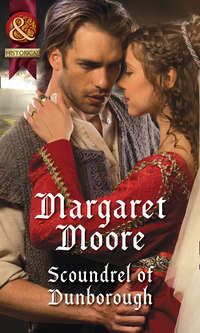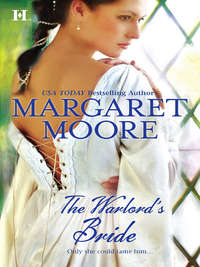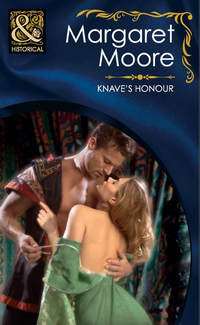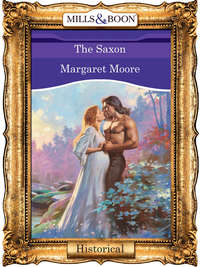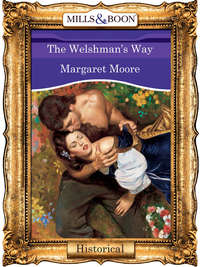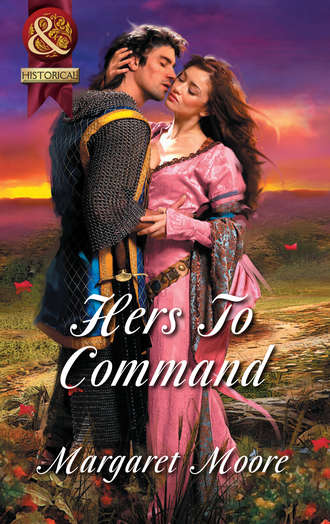
Полная версия
Hers To Command
“You know him?”
“God help me, I do, and I hate the knave.”
Sweeping the sheet behind him as a lady would the skirt of her gown, the knight strode to the table. He picked up the wineskin lying there and lifted it over his mouth, shaking out the last few drops.
Mathilde glanced at Giselle. If this man truly hated Roald… “Why do you dislike him?”
“As there is a lady present, I would rather not say,” the Norman replied as he tossed the empty wineskin back onto the table.
A lady? What did he think she was? “I am Lady Mathilde of Ecclesford,” she declared, “and this is my sister, Lady Giselle.”
The knight ran an incredulous gaze over her and her plain clothing. “You’re a lady? I took you for a servant.”
“Well, I am not.”
“Forgive me my mistake,” he replied, not very contritely, as his hand moved to his waist and the sheet wrapped around it.
“What are you doing?” she exclaimed, turning away.
“I want to hear more about your dilemma, so I think I should dress. Don’t you agree?”
It would be much easier to talk to him if he were dressed, so she didn’t disagree. However, since there was no reason for them to be here while he put on his clothes and indeed, every reason they should not—she retrieved her dagger and started sidling toward the door. Unfortunately, Giselle was apparently fascinated by the corner at which she stared and before Mathilde could catch her eye, the knight declared, “There. Now I am presentable.”
And so he was. He wore plain woolen breeches, a sleeveless leather tunic bound by a wide sword belt holding his scabbard and broadsword over a white shirt loosely tied at the neck. He’d put on a pair of boots that were certainly not new, although they were polished and well cared for.
Without the distraction of his near nudity, Mathilde focused on his handsome face and intelligent brown eyes—when she should be thinking only of how, and if, this man could help them.
Determined to do just that, she said, “We may be related to Roald, but I assure you, he is no dearer to us than he is to you, and not just because we dread what he may do. He has done great harm in the past, and we fear he will do more in the future. He has no honor, or kindness, or mercy.”
“That sounds like the Roald I know,” the Norman agreed.
“Our father died a short time ago,” she continued, a slight catch in her voice, for her grief was still raw. “In his will, he left Ecclesford to Giselle and me, the land to be divided equally between us, with a small sum of money for Roald.
“However, there are still many who believe inheritance should follow the male line above all other concerns. Then Roald should be lord of Ecclesford, and I am certain he will argue so, and try to steal our inheritance away.”
“And likely marry you off to form alliances to his advantage,” the knight added, proving that he knew about Roald’s greed and ambition. “So you want a knight to scare him off and stop him from making any such claim, is that it?”
“Yes. We were told you are the brother of the lord of Dunkeathe in Scotland, and the boon companion of the lord of Tregellas of Cornwall. Is that true?”
“I have that honor, yes,” the knight replied with a courteous bow, smiling in a way that made him look more handsome still. “As it happens, my lady, I have no particular calls upon my time at present and indeed, it would be my pleasure to thwart any plans of Roald de Sayres. Therefore, since it’s also my duty as a knight of the realm to help ladies in distress, I will gladly assist you. And of course, as I am an honorable knight, I would not expect to be paid.”
“Then, Sir Knight—”
“Mathilde,” Giselle interrupted. “May I have a word with you? Alone?”
Mathilde was not pleased by the amusement in the knight’s brown eyes that appeared when he heard Giselle’s request, but she wasn’t willing to ignore her sister’s plea. “Of course,” she said, moving to the door.
Giselle eagerly followed. Once on the stairs, Giselle stopped when they were halfway to the taproom, as if she couldn’t wait to speak any longer. “Mathilde, surely we need not decide about this knight right now, or even today. Let us think on it some more.”
“He might not be here tomorrow—and what more is there to think about?” Mathilde replied, once again struggling to control her impatience. “How many other knights with such associations are likely to ride through this county in the next few days? How many others will hate Roald as he does?”
“We still know very little about him,” Giselle protested. “We don’t even know his name.”
Good God, Giselle was right. Still, that was not so important as his connections. “Whatever this Norman’s name may be, we should accept the aid he offers.”
Giselle’s gaze went from wary to searching. “He’s a very handsome fellow.”
Mathilde couldn’t blame Giselle for her unease. She had good cause to doubt Mathilde’s judgment when it came to men, and this one was very handsome and charming and probably persuasive. Even so, Giselle should also believe she had learned from her mistake.
“Have no fear, Giselle,” Mathilde assured her. “I will be on my guard, as I’m sure you will be, and if it seems he is not behaving as a noble guest should, we can ask him to leave. Now will you accept his help?”
Although she looked far from certain, Giselle sighed and said, “Since I can think of no better plan myself, I will agree—with the understanding that if I think he should leave, you will not argue with me until I cannot think straight.”
Mathilde embraced her sister. “I promise.”
When they returned to the chamber, they found the knight sitting on the bed, one ankle on his knee, whistling a merry and rather complicated little tune. He rose when they entered and gave them another smile. “So, what is it to be? Do I go to Ecclesford or not?”
“Yes, if you will, Sir…?”
He laughed and made a sweeping bow. “Egad, forgive my lack of manners! I can only plead the unusual nature of our meeting. I am Sir Henry D’Alton, knight of the realm, sworn protector of women and children, guardian of the faith, brother of Nicholas of Dunkeathe, brother-in-law of the chieftain of Clan Taran and sworn comrade-in-arms of Lord Merrick of Tregellas.”
His connections were even more significant than Mathilde had been told and she was duly awed. Nevertheless, he looked so pleased with himself as he rattled them off, she was tempted to take him down a peg. But, since he’d agreed to help them, she didn’t. “Most impressive, Sir Henry. If you will gather your things, our escort is in the yard awaiting us.”
“Please ask the innkeeper to have Apollo saddled,” he said, opening the door for them, “and for a crust of bread for me to eat along the way, if you intend to leave immediately.”
“We do.” Indeed, the sooner they were back home, the better she would feel. Although they had no such word, it was possible Roald had come while they were away.
Sir Henry’s lips curved up into a smile. “I can hardly wait to see the look on Roald’s face if he comes to your castle and finds me there.”
Mathilde made no response as they hurried past him, but in truth, she would far rather never see Roald again, and fervently hoped all her precautions would prove pointless.
WEAVING THEIR WAY through scratching chickens, waddling geese and puddles left from last night’s rain, with a gray sky threatening more rain overhead, Mathilde and her sister headed toward their escort. Some of the soldiers leaned against the wattle and daub walls of the stable; others sat on the end of a hayrick. A few had hunkered down in a dry spot under the eaves, and all held cups of ale the innkeeper must have provided them.
Cerdic spotted them first. Barking an order to the rest of the men, their muscular friend set his ale down on a nearby barrel while the other soldiers scrambled to their feet or jumped from the hayrick and prepared to depart.
Like the knight, the tall, blond Cerdic was also a fine example of a warrior: broad shouldered, narrow hipped, with powerful arms and legs. Like many of his Saxon ancestors, he was an expert with the battle ax and if he wasn’t as handsome as Sir Henry, he was hardly homely. His strong features were framed by thick hair that hung past his shoulders. He wore a leather tunic loosely laced and his breeches were of leather, too. His dark cloak was held closed by a large, round bronze brooch that had been his father’s, and his father’s before him. He had the fur of a wolf wrapped around his booted shins, tied on with thin leather strips. All in all, he was an imposing figure.
“It is just as Rafe told us,” Mathilde said with a smile when they reached him. “The Norman knight is the brother of a powerful man in Scotland, the brother-in-law of another, and the friend of the lord of Tregellas in Cornwall. Even better, Sir Henry has agreed to help us.”
Cerdic frowned, for like Giselle, he had never been enthused about Mathilde’s plan. “What wilt thou do if this Sir Henry does not send Roald running off like a hound with its tail between its legs?” he asked, his French tinged with the accent of his people.
Although she had not expected otherwise, his disapproval stung nonetheless. “I don’t question your skill as a warrior, Cerdic,” she replied with a hint of pique. “I wish you would not be so quick to question my plan, especially when I hope it will spare the lives of many of the garrison. But rest assured, if my plan fails and we must fight, I know our men will not fail us.”
That brought a smile to Cerdic’s face, until he caught sight of Sir Henry sauntering toward them, his shoulders rolling with his easy, athletic strides. He wore a thick black cloak and carried a large leather pouch thrown over his shoulder. From inside it came the clink of metal—his chain mail and other armor, she supposed.
“Thou thinkst that little man is going to frighten Roald?” Cerdic asked with amazement.
Only Cerdic would think Sir Henry “little.” To be sure, the Norman was lean, but there was plenty of muscle on his slender frame, as she well knew, and while Sir Henry was not as tall as Cerdic, he was taller than most of their soldiers, especially the dark-haired Celts.
“If not the man himself,” she replied as she looked back to Cerdic, “then his family and friends.”
Sir Henry had to notice Cerdic’s furrowed brow and glaring gray eyes, yet when he reached them, a merry little smile played about his well-cut lips, as if he thought they were going to celebrate his arrival.
Or was he amused by her men? Did he think himself superior? That Normans were naturally better soldiers?
To be sure, her men looked a little slovenly after waiting in the yard, and Cerdic’s hair could use a trim—but Sir Henry’s hair was astonishingly long for a Norman’s, and he was hardly dressed as befit a nobleman. He looked more like a well-to-do merchant, except for his sword.
Or maybe, she thought as she remembered his behavior in the upper chamber, this was simply the man’s normal expression when he was with noblewomen, especially one as beautiful as Giselle.
“Sir Henry, this is Cerdic, the leader of our escort and the garrison of Ecclesford,” she said by way of introduction.
“Your forefathers must have been Saxons,” Sir Henry said amiably, “judging by your hair and that battle ax.”
“I knew thou wert a Norman by thy pretty face.”
Sir Henry continued to smile, yet she could see a growing determination in his brown eyes, and his knuckles started turning white. So did Cerdic’s, and for a moment, it was like watching two powerful stags about to butt heads.
She didn’t want them to come to blows. Cerdic was her friend, and they needed Sir Henry.
“Cerdic,” she interposed, her voice taking on a slightly warning note, “Sir Henry is going to be our guest at Ecclesford.”
Mercifully, Cerdic let go of Sir Henry’s arm and stepped back.
Sir Henry laughed with apparent good humor. “Well, my brawny friend, what say we get on our way? Unless I’m very much mistaken, there’s a storm brewing and I would rather not get wet.”
CHAPTER TWO
AS A COOL AUTUMN BREEZE carrying the scent of rain blew across the hedgerows, Henry studied his companions and contemplated this rather odd turn of events. It wasn’t every day he awakened to find himself being scrutinized by unknown ladies, but as he’d told them, it wasn’t the first time he’d discovered women in his bedchamber, either. Women had been chasing after him since he was fourteen years old, which meant that the flattery and pleasure of such encounters was far from fresh, or even entertaining anymore. He had been far more annoyed than happy to discover two ladies examining him, especially after another nearly sleepless night.
However, he’d also meant it when he’d said he would have considered bedding the beautiful Lady Giselle. Indeed, he had never seen a woman more lovely. She had perfect features, pale skin with a hint of a blush on her cheeks, and lustrous blond hair. She wore a fine mantle of wode-dyed, dark blue wool, held together by a broach of silver. Her gown was fine, too, of deep blue damask and belted with a supple leather girdle. Her veil was made of soft white silk that floated about her round cheeks, and she had stood with her blond head bowed, her eyes demurely downcast, as modest as a nun in a cloistered convent.
Her sister, on the other hand…she was something completely different. She wasn’t pretty, especially when her face was pinched with anger and disapproval, and she had been much more plainly attired. She had been as strong as a young man, too, at least judging by the blow she’d struck when he mistakenly—very mistakenly—grabbed her hand. Was it any wonder he’d thought her a serving wench?
Then she’d acted as if he’d burst in on them. Her nut-brown eyes had fairly snapped with displeasure, and her full lips thinned to near invisibility.
In spite of his annoyance, which he took chivalrous pains to hide after he’d seen Lady Giselle, there’d been a moment when Lady Mathilde glared at him that he recalled bold women made the best lovers, for they were never shy to tell him what they liked, or to ask for his preferences.
Once he learned Lady Mathilde was of noble birth and the beauty’s sister, however, he quickly turned his attention back to Lady Giselle. He became mindful of the sorry state of his purse, his lack of an estate and his age. He was not so young that he hadn’t started to think of marrying and starting a family, especially with the example of his brother and sister, as well as his friend Merrick, to illustrate the joys of domesticity. Years of traveling from place to place, of being always a guest, had lost their luster, too.
His brother would surely counsel him to woo and wed Lady Giselle if he could. She was rich, she was young, she was beautiful—what was lacking? Well, one thing, but at the moment, it didn’t seem like much of a hurdle. Henry had vowed he would be in love with his bride when he wed.
His smile grew as he watched Lady Giselle’s slender body swaying in the saddle. It would surely be an easy thing to fall in love with such a beauty, and he was not without some confidence that he could arouse a similar feeling within her. He had his looks and years of experience with women on his side, and to win the love of such a woman, who would bring lands and wealth as her dowry, was surely worth whatever effort it might take.
And if he won the fair Giselle, Nicholas would finally have to say something good about his younger brother. Nor would he be able to accuse Henry of leading a wastrel existence anymore.
So why not begin the wooing? Henry thought, spurring Apollo to a slightly quicker pace until he was between the ladies.
“Have we much farther to go?” he asked Lady Giselle, giving her his most charming smile. “I’m not sure how long the rain will hold off.”
“Not far now,” Lady Mathilde answered, while her sister nudged her horse forward to ride beside Cerdic.
Whether that was due to her modesty or not, Henry was slightly disgruntled at being so obviously left behind to ride beside Lady Mathilde.
That lady immediately fastened her inquisitive brown eyes onto him and asked, “Why do you hate Roald?”
God save him, she was as bold and blunt as her sister was shy and maidenly.
“You need have no fear of offending my delicate sensibilities, Sir Henry,” she said when he didn’t answer right away. “I can believe anything of Roald.”
Despite her curiosity and her confidence that his reason wouldn’t upset her, the explanation was not a tale he cared to share with a woman. “Surely any man of honor would dislike him.”
She didn’t bat an eye or look away. “He can be charming and sly, and he has more influence at court than we will ever have. Perhaps, if you don’t hate him as much as I think, you may decide it is not worth the risk to offend him. You may even decide you should help him.”
It was an insult to even imply that he was capable of such duplicitous behavior. “I’ve said that I’ll help you, so I will—and even if I hadn’t, Roald will make no overtures to me, nor would I accept them if he did. He hates me as much as I hate him.”
“I must assume, then, you quarreled. Over a wager? Over a woman?”
God’s wounds, she made him sound like a confederate who’d gotten in a bit of a tiff. “I would certainly never wager with Roald and his cronies. For one thing, they probably cheat.”
She slid him a glance that was both shrewd and appraising, but in a complimentary way. “A woman, then?”
That was close to the truth, and yet their animosity sprang from a far different cause than she surely imagined.
Rather than endure her interrogation and who knew what other implications she might come up with, he decided to tell her the truth, if not in complete detail. “When we were both at court, I came upon him trying to force himself on a serving girl.”
As always, the bile rose in his throat as he remembered the poor girl’s terrified face, and a girl she was. She couldn’t have been more than ten years old, but he would spare even this bold, prying lady that unsettling information. “I made him let her go at the point of my sword, so Roald has no love for me.”
At first he thought he saw grim satisfaction on the lady’s features, but it was quickly replaced by a piercing, searching gaze that was as uncomfortable as his brother’s. “When did this happen?”
“Two years ago.”
“He was not charged with trying to rape her?”
Henry winced inwardly at the harsh, if accurate, word. It was disconcerting to hear a lady speak so directly of such an act. “No.”
“So although you caught him in the process of committing a crime, you let him go?”
Henry flushed, feeling a twinge of guilt at her accusation, although he’d told himself that night, and ever after, that he had done nothing to feel guilty about when he had allowed Roald to leave. “You didn’t see the girl, my lady, or hear her sobs and pleas not to call the guard. She was sure no one would take her word over Roald’s, and that Roald would say she led him on, and then her reputation would be ruined. I could not disagree, so yes, I let him go.”
The lady tilted her inquisitive head with its pointed little chin. “Many noblemen would not interfere at all, believing a servant’s body theirs by right, whether she was willing or not.”
“I don’t,” he answered with firm honestly. “I would never take a woman against her will, whether high born or low, and I have never made a woman cry out in pain and anguish, or left her bruised and bleeding.”
Lady Mathilde looked ahead at Cerdic and her sister, and he regretted speaking with such force. He should have remembered that, no matter her appearance or her manner, she was still a lady.
“That girl was fortunate you were there to help her,” Lady Mathilde said quietly, and with sincerity and compassion—a hint of gentleness and sympathy that was rather unexpected, and not unpleasant.
Inspired to be pleasant in return, Henry nodded at Cerdic at the head of the cortege. The fellow had a sword at his side and a rather fearsome battle ax strapped to his back. The shaft of his ax had to be four feet long and the head looked sharp enough to split hairs. “It’s rather unusual to see an Englishman in a position of such responsibility and trust.”
In truth, he couldn’t think of any Norman nobleman he knew who would give an Englishman that much responsibility, or consider one a friend. It had been nearly two hundred years since the Conquest, but old enmities died hard.
“Cerdic’s family was royal before the Normans came,” she replied.
She obviously admired the fellow. Henry wondered just how much, and if that extended to being on intimate terms. Not that it mattered. He had no interest in the bold and brazen Lady Mathilde. “You’re from Provence, aren’t you?” he asked, commenting on her accent.
“Yes, we were born there and lived there for most of our childhood.”
Just like the queen Henry detested, the woman he believed was spurring his countrymen to rebellion with her selfish advancement of her own family.
“The same as Queen Eleanor,” he remarked, wondering how she’d react to that.
Lady Mathilde looked as if she disliked the queen as much as he did. “If what Papa said about her family is true, it is a pity for England she is married to the king.”
That was interesting. “What did your father say about her family?”
“That the only thing they produced was beautiful women, and the only intelligence they showed was in arranging marriages.”
That was so close to the mark, Henry had to laugh. Then, because he was Henry, he smoothly said, “The queen’s family isn’t the only one capable of producing beautiful women.”
Lady Mathilde frowned.
Clearly, he had erred. Obviously, this lady would never be impressed with flattery or, perhaps, reminders that her sister was beautiful while she was not.
“My father didn’t like Normans, either,” she declared. “He said they always wanted to make war and didn’t appreciate music or art.”
He had upset her with his comment, and since he was well aware of what it was like to be compared to a sibling and found lacking, he didn’t take offense at her umbrage.
Her observation was also unfortunately true, at least in his case. He had little appreciation for art or music, except a clever, ribald ditty. Yet never before had he been made to feel that was a failing. “Someone has to defend the kingdom,” he noted.
“William was defending England when he invaded it? I must have been seriously misinformed.”
He would have found her remarks more amusing if she didn’t look so smugly superior. “Well, sometimes we get carried away—and sometimes, such men are necessary to defend estates.”
A blush colored her smooth cheeks, nearly overwhelming the few freckles on her nose.
“I meant no offense, Sir Knight,” she said after a moment, and looking not nearly so well pleased, “and I do not necessarily share my father’s views about the Normans. He did admire some things about your countrymen—Magna Carta, for instance, and how it set a limit on the king’s power. That is why Papa gave up all claim to his French estates to his elder brother, Roald’s father, in exchange for Ecclesford. Then Papa discovered that the English court is not very different from that of France. He was sorely disappointed.”
Henry couldn’t disagree. Noblemen were men first, and noble second, so they brought their ambition, greed, desires and needs to court with them.
“So Papa retired to Ecclesford and never went near the royal court again.”
That would explain why he’d never seen either of the ladies there, or even heard of them.
“And that is why we have no noble friends to call upon, you see, or I would not have to ask a stranger for his help.”
He suddenly felt like a lout for being annoyed with her, or anything she said. She and her sister were ladies in need of his aid, and that should be all that concerned him.




